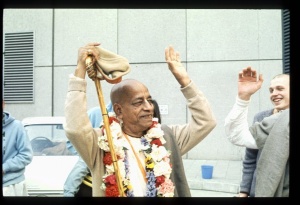SB 6.13.10

A.C. Bhaktivedanta Swami Prabhupada
TEXT 10
- śrī-śuka uvāca
- evaṁ sañcodito viprair
- marutvān ahanad ripum
- brahma-hatyā hate tasminn
- āsasāda vṛṣākapim
SYNONYMS
śrī-śukaḥ uvāca — Śrī Śukadeva Gosvāmī said; evam — thus; sañcoditaḥ — being encouraged; vipraiḥ — by the brāhmaṇas; marutvān — Indra; ahanat — killed; ripum — his enemy, Vṛtrāsura; brahma-hatyā — the sinful reaction for killing a brāhmaṇa; hate — was killed; tasmin — when he (Vṛtrāsura); āsasāda — approached; vṛṣākapim — Indra, who is also named Vṛṣākapi.
TRANSLATION
Śrī Śukadeva Gosvāmī said: Encouraged by the words of the sages, Indra killed Vṛtrāsura, and when he was killed the sinful reaction for killing a brāhmaṇa [brahma-hatyā] certainly took shelter of Indra.
PURPORT
After killing Vṛtrāsura, Indra could not surpass the brahma-hatyā, the sinful reactions for killing a brāhmaṇa. Formerly he had killed one brāhmaṇa, Viśvarūpa, out of circumstantial anger, but this time, following the advice of the sages, he killed another brāhmaṇa purposely. Therefore the sinful reaction was greater than before. Indra could not be relieved from the reaction simply by performing sacrifices for atonement. He had to undergo a severe series of sinful reactions, and when he was freed by such suffering, the brāhmaṇas allowed him to perform the horse sacrifice. The planned execution of sinful deeds on the strength of chanting the holy name of the Lord or undergoing prāyaścitta, atonement, cannot give relief to anyone, even to Indra or Nahuṣa. Nahuṣa was officiating for Indra while Indra, absent from heaven, was going here and there to gain release from his sinful reactions.